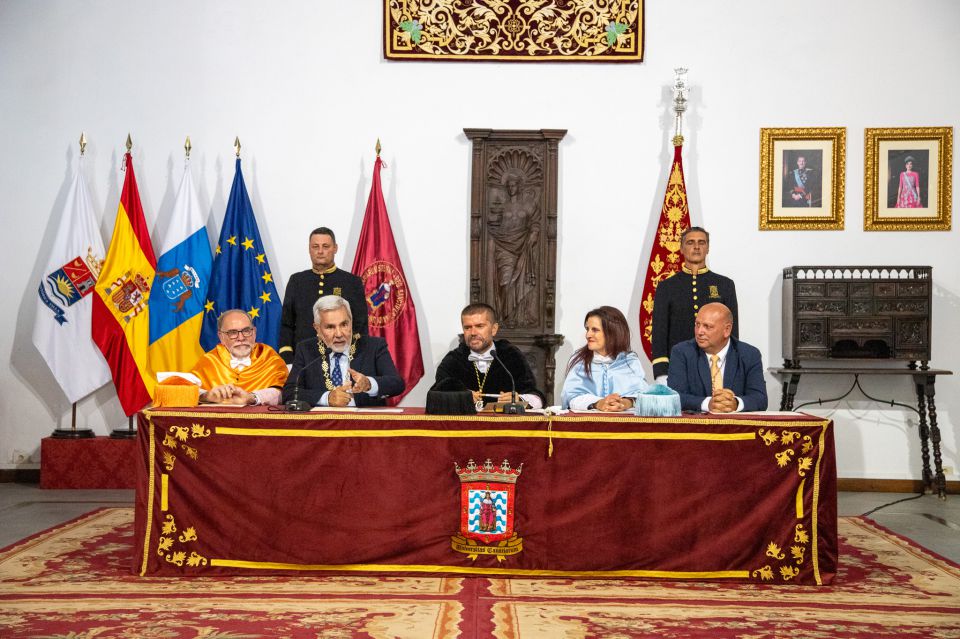On Monday afternoon, 30th September, the inauguration of the 2024-2025 academic year took place at the South Tenerife University Campus in Adeje. The event was presided over by the Rector of the University of La Laguna, Francisco Javier García Rodríguez, Adeje mayor José Miguel Rodríguez Fraga, the Vice-Rector for Culture and University Outreach, Isabel Karely León Pérez, and Adeje education councillor, Adolfo Alonso Ferrera.
The opening event, which marks the tenth cohort of graduates, was attended by the faculty of the Tourism Degree and its students. Also present were members of the council and representatives from many important local business and tourism associations. The event began with a minute of silence in memory of the victims of the recent shipwreck off the coast of El Hierro.
Mayor José Miguel Rodríguez Fraga, highlighted in his inaugural speech the importance of collaboration between the Town Hall and the University of La Laguna. He emphasised the key role that education and training play in the tourism sector, which is vital for the economy of the Canary Islands, and Adeje in particular. He underscored the long-standing relationship with the university and stressed the need to continue working together to prepare students not only for employment but also to encourage them to think critically about tourism, a complex phenomenon with economic, sociological, and cultural implications.
Rodríguez Fraga also highlighted the importance of creating quality tourism that benefits both the local population and visitors. He mentioned the development of educational infrastructure in the municipality, such as the new Integrated Vocational Training Centre and the upcoming centre for people with special needs.
Finally, Rodríguez Fraga called for the preservation of traditional Canarian values of friendliness and hospitality and reflected on the challenges of tourism in an increasingly globalised world.
In his speech Rector Francisco Javier García Rodríguez also highlighted the historical relationship between the university and the municipality of Adeje, emphasising the positive impact of this educational offering on the professional and social development of students from the south of the island. The rector stressed the need for university education to go beyond simple vocational training, advocating for the development of individuals capable of thinking critically and making independent judgements. He differentiated between training for employment and the broader education that universities should provide.
García Rodríguez praised investment in public education as a driver of economic growth, mentioning that every euro invested in the University of La Laguna generates four euros in economic return. Finally, he congratulated the mayor of Adeje for his support of public education and reaffirmed the university’s commitment to continue collaborating to strengthen the educational offering in the south.
The inaugural speaker, Professor Javier Rivero Grandoso, a professor and doctor in Literary Studies specialising in crime fiction, delivered a lecture titled “Walking Through Literature: New Models of Cultural Tourism,” in which he explored literary tourism as a form of cultural tourism, detailing its potential in Tenerife.
Although the humanities often receive little attention in tourism projects, the professor argued that literature is a valuable intangible heritage that can attract tourists by offering cultural alternatives. He presented several successful examples, such as the museum houses of famous authors in Spain and abroad, like Cervantes, Shakespeare, and Joyce.
In the case of Tenerife, the inaugural speaker bemoaned the scarcity of literary routes and proposed the development of itineraries based on the lives and works of figures who had a significant connection to the island, such as Agatha Christie, André Breton, and Alexander von Humboldt. These routes, according to the speaker, would not only add value to the literary and cultural heritage but also offer sustainable alternatives to the current tourism model.
Finally, Professor Rivero Grandoso emphasised the need to rethink the tourism sector in the Canary Islands and asserted that the University of La Laguna should play a key role in this process.
